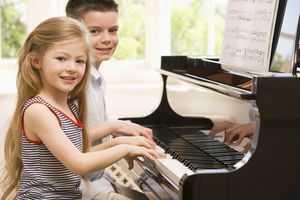 We’ve all heard the old saying, “Music soothes the savage beast,” and know the benefits of music for unborn and newborn babies. But what about toddlers? If there ever was a savage beast to tame, it would be an unruly toddler. But beyond lullabies, what benefits does music for toddlers bring? Let’s examine some of the ways toddlers are influenced for the better by music, and how to utilize music for toddlers to the best effect.
We’ve all heard the old saying, “Music soothes the savage beast,” and know the benefits of music for unborn and newborn babies. But what about toddlers? If there ever was a savage beast to tame, it would be an unruly toddler. But beyond lullabies, what benefits does music for toddlers bring? Let’s examine some of the ways toddlers are influenced for the better by music, and how to utilize music for toddlers to the best effect.
- Toddlers learn through movement. Music can help hone and perfect gross and fine motor skills, which is why musical games are such a good idea for little ones. Setting any activity to music and adding a motion componet to it really drives things home. Try making up songs while doing things, such as having your child brush his teeth or make his bed. You’ll find the activity goes faster, is more fun, and makes a bigger impact on your toddler.
- Bond with your child through music, by singing and playing instruments together. Whether it’s “The Wheels on the Bus,” “Twinkle Twinkle Little Star” or Bob Marley, find something that you and your child enjoy together. It encourages closeness and trust, and is just plain fun.
- Expose your child to a wide variety of musical types, to find out what they like and to broaden their horizons. The differences in rhythm and melody are great ways to foster diverse tastes. Maybe they will like African or South American beats, or the harmony and soul of folk or jazz. But when it comes to playing tunes for your kids, think cheerful and simple. Try to stay away from head-banging metal or hardcore rap. Studies on animal seem to show that constant exposure to chaotic and/or discordant kinds of music alters the brain’s physiological structure. Even plants seem to dislike these types of music, according to some clinical studies conducted on the relationship between music and its influence on plant growth. Ivy plants growing on a building where classical music was played throughout the day appeared to fare better than ivy on houses where the occupants blasted hard rock music.
- Tailor your song selections to appropriate times of the day—slower tunes for nighttime, more upbeat during the day. Music can set the tone and pace of the day, so utilize it!
- Older kids may also enjoy a song that has a narrative they can follow, such as “There Was an Old Lady Who Swallowed a Fly,” or “Miss Mary Mack.” Encourage your toddler or preschooler to move to the music and express his emotions.
- Your musical selections don’t have to be recorded ones, either. Take it live! Break out into song yourself once in a while. Tongue-twisting tunes like “The Name Game” (“Nina, Nina, bo-bina, banana, fana, fofina, mee-mi-momina, Nina) are fun. Songs can become fun ways to pass the time on trips, too.
- If your child is at least three years old, learning how to play instrument can be very beneficial to his growth and development. That’s when a child’s brain circuits for music training start to mature. Clinical studies suggest that receiving music lessons can increase a child’s brain power. A University of California at Irvine study shows that 3- and 4-year-olds who received piano lessons did better on tests that measured their spatial-temporal reasoning (ability to to think in space and time) than those kids who didn’t.
- Kids who learn how to play an instrument may be also able to learn how to do complex mathematical problems earlier than those kids who have had no musical training. The piano is a good instrument to start with, because kids don’t have to master any special fingering, as they would with a guitar or other stringed instrument, which can prove difficult for small hands. Plus, the linear progression of the piano’s keys helps firm up the concept of the music scales at an early age.
Let music be an integral part of your child’s life, but don’t make it your mission to mold a musical genius. Child prodigies like Mozart, who wrote his first symphony at age 8, are rare. But if you offer your child a chance to be immersed in the world of music (especially if you vary the selections), he’ll probably grow up to be the kind of person who appreciates all kinds of music. Encourage him to take up a musical instrument, but don’t push. Music for toddlers should be all about fun and learning, not pressure to succeed or excel.
When you expose your child to culture, he acquires a taste for the things in life that will feed his soul. Music does just that. As Shakespeare put it, “If music be the food of love, play on.”



